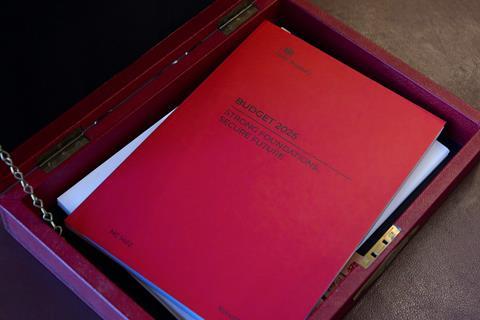Surcharge to apply to homes worth more than £2m, with higher rate for properties over £5m
Council taxes will rise for those living in the UK’s highest value properties, the chancellor of the exchequer has confirmed in today’s Budget announcement.
The so-called ‘mansion tax’ had been much trailed in the weeks leading up to the fiscal event and the accuracy of these reports was verified even before Rachel Reeves took to despatch box due to an unprecedented and embarrassing leak by the Office for Budget Responsibility.

Before announcing the tax rises, Rachel Reeves said she had made “fair and necessary choices” which would “ensure that the wealthiest contribute the most.”
Currently, she said, a Band D home in Darlington or Blackpool pays nearly £300 more in council tax than a £10m mansion in Mayfair.
To address this, she committed to introducing a High Value Council Tax Surcharge, an annual £2,500 charge for properties worth more than £2m, rising to £7,500 for properties worth more than £5m.
Reeves also revealed that taxes would be increased on income from assets, including property.
Currently, she said, a landlord with income of £25,000 can pay nearly £1,200 less than a tenant with a salary of the same value, because national insurance is not charged on property, dividend or savings income.
“It’s not fair that the tax system treats different types of income so differently, and so I will increase the basic and higher rate of tax on property, savings and dividend income by two percentage points and the additional rate of tax on property and savings income by two percentage points,” Reeves announced.
From April 2027, the property basic rate will be 22%, the property higher rate will be 42%, and the property additional rate will be 47%. Increases to the tax paid on income from assets are expected to raise £2.2bn in 2029‑30.
The property income tax changes will apply in England, Wales and Northern Ireland. In documents published after the Budget, the Treasury said it would engage with devolved governments in Scotland and Wales “to provide them with the ability to set property income rates in line with their current income tax powers in their fiscal frameworks”.
Allan Willen, economics director at Glenigan, said the new taxes on higher value homes could “have a disproportionately disruptive impact on the wider housing market”, despite being targeted at the higher end of the market.
Budget at a glance
- Freeze on national insurance thresholds extended for three years from 2028
- Legal minimum wage to rise in April by 4.1% for over 21s and by 8.5% for 18 to 20-year-olds
- Plans to converge two rates of landfill tax halted
- £13bn funding for seven regional mayoralties
- “Mansion tax” of between £2,500 and £7,500 for properties valued over £2m.
- OBR upgrades growth forecast from 1% to 1.5% but downgrades productivity
- Fiscal headroom doubled to £22bn
- Social housing rent convergence details to be announced in January
- The two-child limit in the Universal Credit child element will be removed from April 2026
- Extra £48m of funding to boost capacity in planning system by recuriting 350 extra planners by expanding the Pathways to Planning Graduate Scheme and creating a new Planning Careers Hub
- £783 million for a new local growth programme over three years to support regeneration across Scotland, Wales and Northern Ireland.
- Additional £1.5 billion in capital investment to tackle fuel poverty through the Warm Homes Plan
- Funding for the Energy Company Obligation will end after March 2026
- £1.5 billion of new funding to support households facing fuel poverty
- Consultation on the “reform of VAT rules to incentivise the development of land intended for social housing.”
He said this could “deter new house construction, especially in parts of the UK such as London, where property prices are highest”.
By contrast, Adam Bovingdon, managing director of property development at United Trust Bank, said that the mansion tax “would have created far less news without this emotive nickname”.
“If it was called what it is, an increase in council tax for high value homes representing less than 1% of households in the UK, most people would have dismissed it as largely irrelevant to the general public,” he said.
However, he also emphasised that “some form of stimulus” for housebuilding, such as an SME Help to Buy scheme or a stamp duty break for first-time buyers would have been welcomed.
Budget 2025: full coverage
Housebuilders to pay more in minimum wages but spared costly landfill tax rise
Government confirms £48m to hire 350 planners
Rent convergence details to be announced in January, Treasury confirms
Reaction round-up: Relief at landfill tax u-turn and scrapping of two-child benefit cap











No comments yet